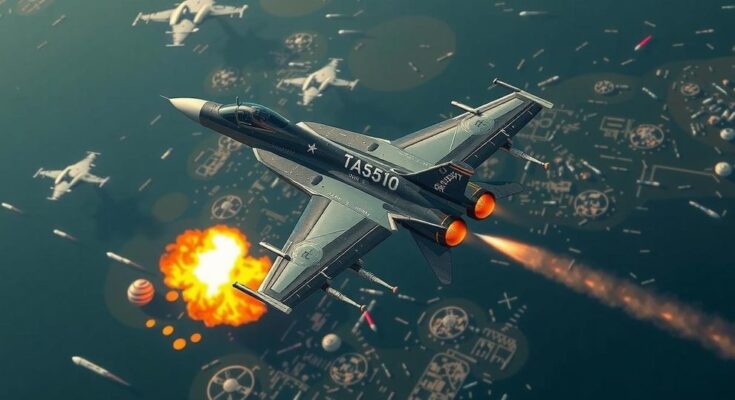Israel has launched airstrikes against Iran in retaliation for missile attacks, marking a significant escalation in tensions. This offensive targets military sites and could risk a broader conflict in the region, compounded by ongoing hostilities with Iranian-backed groups like Hezbollah and Hamas. The situation remains fluid as both sides assess the consequences of this military action.
On a recent Saturday morning, Israel conducted a series of airstrikes against Iran, characterizing the action as a responsive measure following an attack by Iran that involved the firing of ballistic missiles towards Israeli territory earlier in October. Explosions were reported in Tehran, though official information regarding casualties and damage remains unavailable. This military offensive has the potential to escalate tensions significantly between Israel and Iran amid ongoing conflicts in the broader Middle East, particularly with Iranian-supported militant groups such as Hezbollah and Hamas actively engaged in hostilities against Israel. The strikes, which were reported to focus on Iranian military facilities associated with missile production and aerial capabilities, have drawn attention due to their unprecedented nature; it marks the first public acknowledgment by Israel of direct attacks on Iranian installations since the Iran-Iraq war of the 1980s. The Israeli military has firmly stated that it feels compelled to protect its sovereignty and security in light of continuous provocations from Iran and its associates. Initial reactions from both nations show an ambiguous landscape regarding the overall impact of the strikes, with Iranian state media acknowledging the explosions but attempting to minimize the incident’s significance. Anthony Blinken, the U.S. Secretary of State, had been engaged in regional diplomacy around the time of these airstrikes, emphasizing the importance of restraint to prevent further conflict escalation. This marked escalation is part of a larger context in which Israel has faced a series of missile and drone attacks from Iran, particularly following the notable missile barrage on October 1 that resulted in limited casualties but significant alarm within the Israeli population. Iran has asserted that its missile attacks were retaliatory actions aimed at Israel due to prior aggressive military moves that have resulted in Iranian military personnel deaths. Israeli Prime Minister Benjamin Netanyahu has expressed that Iran made a significant miscalculation, tacitly signaling a shift towards more aggressive military posturing. The ongoing conflict has seen Israel enduring continuous rocket attacks along with retaliatory strikes, amidst heightened military activities in Lebanon and Gaza, indicating a sustained period of unrest and hostilities. The consequences of these latest airstrikes may prompt a reevaluation of U.S. involvement in the region, as the shadow war between Israel and Iran intensifies, following years of covert hostilities, assassinations, and sabotage efforts linked to both sides. In summary, the act of striking Iranian targets illustrates Israel’s firm stance on responding to perceived threats while further entrenching the cycle of violence in a region already fraught with conflict.
The recent airstrikes by Israel against Iran form part of the ongoing conflict between the two countries, which have been adversaries since the 1979 Islamic Revolution. The long-standing animosity is rooted in Israel’s concerns regarding Iran’s military advancements, including nuclear capabilities and support for hostile groups such as Hamas and Hezbollah. The latest instigation appears to have been spurred by direct missile attacks originating from Iran and aims to demonstrate Israel’s resolve in protecting itself alongside maintaining geopolitical stability in an already volatile region. Historically, Israel has taken actions against Iranian interests, including military strikes on perceived threats, cyber operations, and assassination campaigns targeting Iranian scientists. However, the current escalation raises alarms over the prospect of an outright war, especially considering ongoing military engagements between Israel and Iranian proxies plagued throughout Lebanon and Gaza. With U.S. interests in the region also at stake, the unfolding situation warrants careful observation as diplomatic efforts seek to mitigate further conflict.
In conclusion, Israel’s recent military strikes on Iranian targets represent a significant and dangerous escalation in a conflict that has persisted for decades. The backdrop of these attacks is steeped in a series of retaliatory actions and ongoing violence among various factions within the Middle East. The reactions from both sides suggest a deepening crisis that could engulf regional powers and exacerbate the humanitarian situation in areas already impacted by conflict. Going forward, the international community’s role in mediating these tensions will be crucial as all parties attempt to navigate a path toward de-escalation amid increases in military engagement.
Original Source: www.wral.com




